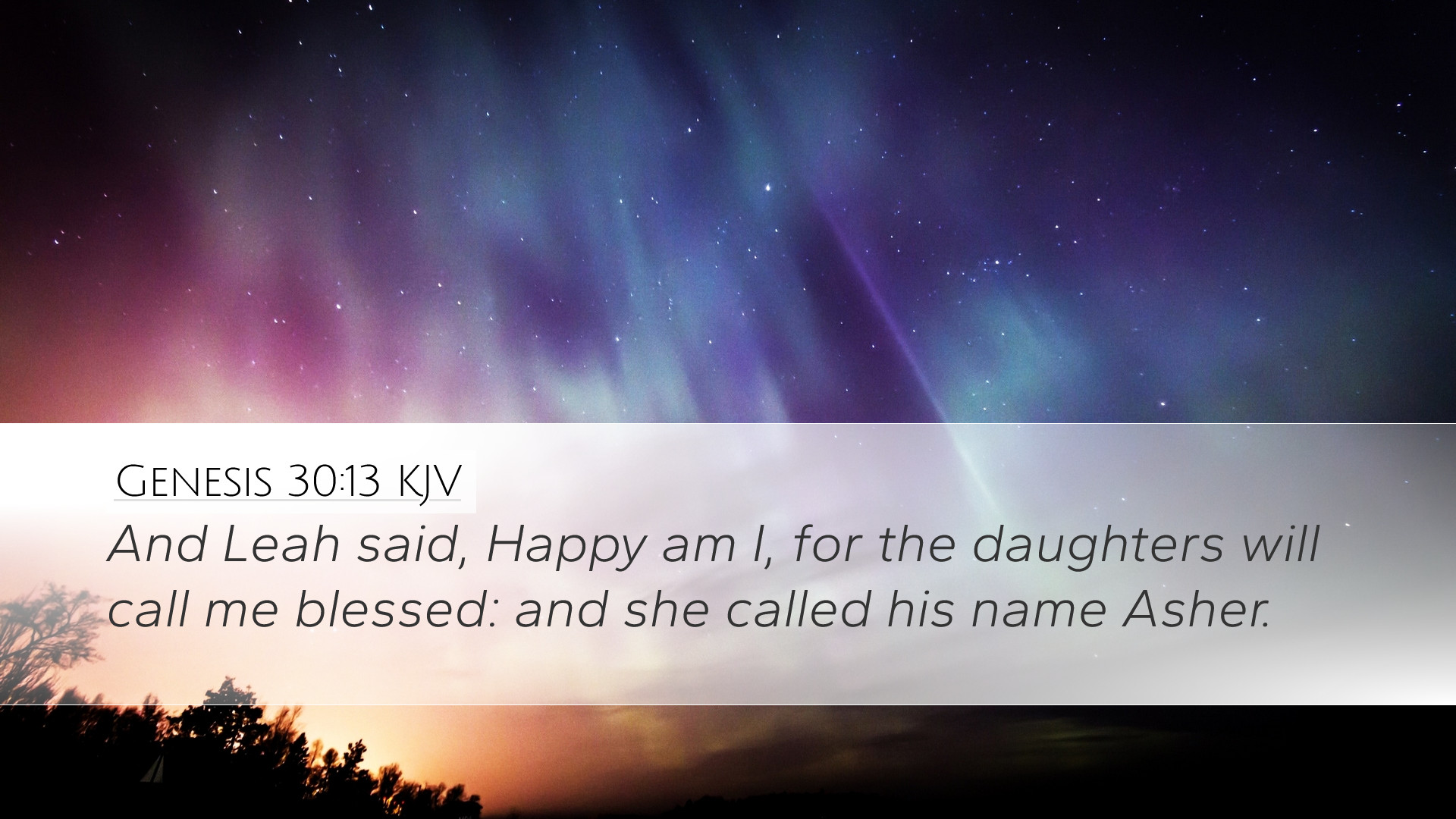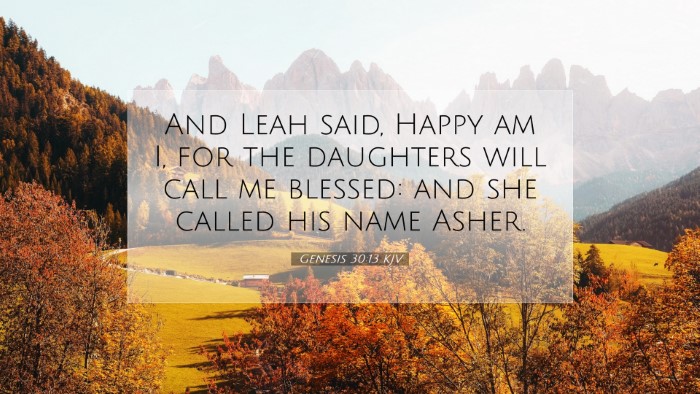Commentary on Genesis 30:13
Verse: "And Leah said, Happy am I, for the daughters will call me blessed: and she called his name Asher." - Genesis 30:13
Introduction
This commentary on Genesis 30:13 delves into the rich context and theological implications of Leah's declaration upon the birth of her son, Asher. By drawing insights from renowned public domain commentaries, we aim to enhance the understanding of this passage for pastors, scholars, and students of the Bible.
Contextual Background
At this point in the narrative, Leah, the first wife of Jacob, is addressing her complex relationship with her husband and her rivalry with her sister, Rachel. Leah's experiences of being unloved and overshadowed by Rachel's beauty accentuate the significance of her statement of happiness.
Insights from Commentaries
Matthew Henry's Commentary
Matthew Henry observes that Leah's joy is deeply personal, emerging from the birth of her son. He notes that her name, Asher (meaning "happy"), symbolizes her spiritual and emotional state. Henry points out that Leah reflects on her circumstances—feeling blessed amidst her struggles. Henry emphasizes how Leah's happiness stems from recognizing God's favor in her life, suggesting that true happiness comes from divine blessing rather than human approval.
Albert Barnes' Commentary
Albert Barnes elaborates on the name "Asher," highlighting its significance as a declaration of joy. He comments on the cultural implications of Leah’s words, pointing out that in the ancient Near Eastern culture, a mother’s status was largely defined by her ability to bear children. Barnes emphasizes that Leah's proclamation of joy may arise from relief and finally seeing a tangible sign of her worth, contrasting sharply with Rachel's earlier envy. Furthermore, he explores the significance of community validation, suggesting that Leah desires to be recognized among the "daughters" of her society.
Adam Clarke's Commentary
Adam Clarke provides an analysis of the term "blessed" in Leah's declaration. He elaborates that Leah's hope was not only in her own child but also in the reputation that her son would bring. Clarke explains that in Hebrew tradition, the achievement of a mother was largely reflected in the perceptions of her offspring. This aspect of cultural identity adds layers to our understanding of Leah’s emotional response as she claims, "the daughters will call me blessed." He highlights that Leah's joy may also be seen in the unfolding narrative of divine purpose, asserting that though she was often sidelined, God had a vital role for her lineage.
Theological Implications
The theme of divine blessing runs deeply in this passage. Leah finds contentment and joy in Asher’s birth, which serves as a reminder that deliverance and recognition often arise through God’s providence. Leah's experience resonates with anyone who has faced feelings of inadequacy or marginalization, reminding us that God’s faithfulness can bring joy during difficult times.
1. The Value of Divine Approval
Leah's happiness signals the importance of divine approval over societal acceptance. Her joy is not solely based on her standing with Jacob but on her relationship with God. This principle reflects the broader biblical theme that true fulfillment comes from alignment with God's will and acknowledgment of His blessings.
2. The Narrative of Rivalry and Redemption
Leah’s rivalry with Rachel illustrates the human condition — jealousy, desire for love, and recognition. In claiming happiness through Asher, there is also a hint of redemption and hope for shared familial bonds despite competition. The names chosen for Leah's children often reflect her personal journey, and in Asher, she sees a form of victory over her predicament.
3. The Universality of Joy in Adversity
Leah’s transformation from strife to joy speaks to the universal Christian experience of finding joy amid adversity. This passage encourages believers to seek God’s perspective in life’s challenges and to embrace the blessings that may arise from them, mirroring Leah’s acknowledgment of happiness despite her struggles.
Conclusion
Genesis 30:13 invites readers to reflect on how personal struggles can lead to divine encounters that reshape our identity and purpose. Through Leah’s words, we learn that joy can coexist with sorrow, and that God’s blessings often come in unexpected forms. The life of Leah serves as a testament of God’s unwavering presence, reminding us of the beauty in bearing fruit through faith, patience, and hope.


